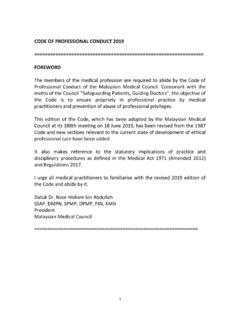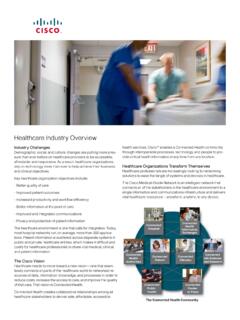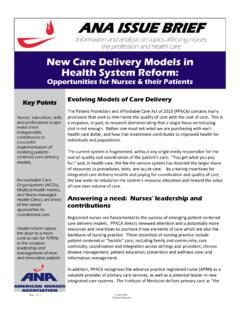Transcription of The Malaysian Medical Council (MMC) approved the revised ...
1 1 The Malaysian Medical Council (MMC) approved the revised guidelines on Confidentiality atits meeting on 11 October 2011. All practitioners are reminded to comply with theseguidelines which will be used by the MMC in any disciplinary Medical practitioner registered with the Malaysian Medical Council (MMC) has rights,privileges and responsibilities. The practitioner is expected to meet the standards ofcompetence, care and conduct set by the Malaysian Medical Council . This document setsout the MMC's guidelines on confidentiality. It is an extension of the principles stated in theMMC s Code of Professional Conduct, its guideline Good Medical Practice and otherguidelines of the informationElectronic Medical required by lawDisclosures required by statutesDisclosures to courts or in connection with legal with consentSharing information within the healthcare team or with othersproviding careDisclosures for which expressed consent should be patient s interestDisclosure in the patient s Medical interestsDisclosures where a patient may be a victim of neglect or public interestDisclosures in the public interestDisclosures for Medical teaching, research, clinical audit and othersecondary about patients who lack capacity to consentDisclosures in relation to the treatment sought by information with a patient s spouse, partner, carers.
2 Relatives and other shared after a patient s inquiries about Medical Council Patientshave the right to expect that there will be no disclosure of any personalinformation, which is obtained during the course of a practitioner's professional duties,unless they give justification for this information being kept confidential isthat it enhances the patient-doctor relationship. Without assurances about confidentiality patients may be reluctant togive doctors the information they need in order to provide good The professional duty of confidentiality covers not only whata patient may reveal to thepractitioner, but also what the practitioner may independently conclude or form an Confidentiality is an important duty, but it is not absolute. A practitioner can disclosepersonal information if:(a)itis required by law (paragraphs 15-20);(b)the patient consents either implicitly for the sake of their own care or expressly forother purposes; or(c)it is justified in the public interest (paragraphs 34-48).
3 4. When disclosing information about a patient, the practitioner shall:(a) use anonymised or coded information if practicable and if it will serve the purpose(b) be satisfied that the patient:(i) has ready access to information that explains that their personal information might bedisclosedfor the sake of their own care, or for clinical audit, and that they can object;(ii) has not objected(c) get the patient s expressed consent if identifiable information is to be disclosed forpurposes other than their care or clinical audit, unless the disclosure is required by law orcan be justified in the public interest(d) keep disclosures to the minimum necessary, and(e) keep up to date with, and observe, all relevant legal requirements, including thecommon law and data protection a practitioner is satisfied that information should be disclosed, the practitionershall act promptly to disclose all relevant A practitioner shall respect, and help patients to exercise, their rights to:(a) be informed about how their information will be used, and(b) have access to, or copies of, their health PROTECTING INFORMATION7.
4 A practitioner shall take steps to ensure that the patient s confidentiality is maintainedregardless of the technology used to communicate health information. Practitioners leavingmessages on answering machines or voice messaging systems should leave only their names3and telephone numbers and not the confidential information. This same caution must beexercised when sending confidential material by mail, facsimile or electronic Many improper disclosures are unintentional. The practitioner shall not discuss apatient s information in an area where the practitioner can be overheard or leave patient srecords, either on paper oron screen, where they can be seen by other patients,unauthorized health care staff or the public. The practitioner shall take all reasonable stepsto ensure that consultations with patients are If a practitioner is concerned about the security of personal information in premises orsystems provided for the practitioner s use, the practitionershall follow the MMC sguidelines on raising concerns about patient safety, including concerns about confidentialityand information a practitioner is responsible for personal information about patients, thepractitioner shall ensure that the information and any documentation about it areeffectively protected against improper disclosure at all times.
5 Professional expertise shouldbe used when selecting and developing systems to record, access and send electronic practitioner shall ensure that administrative information, such as names and addresses,can be accessed separately from clinical information so that sensitive information is notdisplayed Medical Records11. Electronic Medical records offer an enhanced capacity to manage patient practitioner has a responsibility, as a custodian of patient s Medical records, to ensuretheintegrity, confidentiality and availability of the Medical The practitioner shall ensure that there is an information governance policy withprotocols and procedures to ensure that patient information is documented, maintainedand disclosed,in accordance with all the Principles of Confidentiality as stated in thisdocument, at all times, particularly during the transition from paper based records toelectronic The practitioner shall ensure particular cognizance is taken of thefollowing keyprinciples:(a) seek patient s consent to disclosure of information, whether or not patients can beidentified from the disclosure.
6 Any exemptions are subject to existing provisions under therelevant MMC guidelines.(b) anonymiseddata where unidentifiable data will serve the purpose(c) keep disclosures to the minimum The measures that should be taken to ensure confidentiality include (The list is notexhaustive):(a) physical security measures to prevent unauthorized access;4(b) access and authorization processes to ensure only legitimate users have access to themedical record and that each user has the appropriate level of access to the medicalrecords;(c) the maintenance of audit logs to support the authenticity of additions to the medicalrecords;(d) the protection of any part of an electronic Medical record from being deleted.(e) read-only formats for external documents stored in the Medical records;(f) adequate protection whenever Medical records are disclosed to health care providers orpatients;(g) regular back-up of the Medical records, preferably daily for in-patients;(h) adequate virus protection to ensure the Medical records are not modified or destroyedby external factors;(i) contingency plans for disaster recovery and denial of service attacks;(j) ensure that no hardware contains any personally identifiable patient information prior todisposal which must be complete; and(k) enhanced security additional encryption or authentication processes, whennetworks are more exposed wireless devices and remote access, or where theequipment that store information are on drives that are at risk of loss or theft laptops,personal digital assistants(PDAs)III.
7 DISCLOSURES REQUIRED BY LAWD isclosures required by statute15. The practitioner shall disclose information to satisfy a specific statutory requirement,such as notification of a known or suspected case of certain infectious Various regulatory bodies have statutorypowers to access patient s records as part oftheir duties to investigate complaints, accidents or health professionals fitness to practitioner shall satisfy himself or herself that the disclosure sought is required by lawor can be justified in the public interest. Many regulatory bodies have codes of practicegoverning how they will access and use personal Whenever practicable, the practitioner shall inform patients about such disclosures,even if their consent is not required unless that would undermine the Patient records or other personal information may be required by the MMC or otherstatutory regulators for an investigation into a healthcare professional s fitness to information is requested, but not required by law, or if the practitioner is referringconcerns about a health professional to a regulatory body, the practitioner shall, ifpracticable, seek the patient s expressed consent before disclosing personal information.
8 Ifa patient refuses to consent, or if it is not practicable to seek their consent, the practitionershall contact the appropriate regulatory body, to help him or her decide whether thedisclosure can be justified in the public interest5 Disclosures to courts or in connection with legal proceedings19. The practitioner shall disclose information if ordered to do so by a judge or presidingofficer of a court. The practitioner shall object to the judge or the presiding officer ifattempts are made to compel him or her to disclose what appears to be irrelevantinformation, such as information about a patient s relative who is not involved in The practitioner shall not disclose personal information to a third party such as anadvocate or solicitor, policeofficer or officer of a court without the patient s expressedconsent, unless it is required by law or can be justified in the public DISCLOSURES WITH CONSENT21.
9 A practitioner may release confidential information in strict accordance with thepatient'sconsent, or the consent of a person authorized to act on the patient's patient sconsent to disclosure of information is part of good Medical information within the healthcare team or withothers providing care22. Modern Medical practice usually involves teams of doctors, other health care providers,andsometimes people from outside the health care professions. The importance of workingin teams isexplained in the MMC's guideline Good Medical Practice . Toprovide patientswith the bestpossible care, it is often essential to exchange confidential informationbetween members of theteam, on a need to know A practitioner shall ensure that patients understand why and when information may besharedbetween healthcare team members, and any circumstances in which healthcareteam members maybe required to disclose information to third Where the disclosure of relevant information between health care professionals isclearlyrequired for treatment to which a patient has agreed, the patient's expressedconsent may not berequired.
10 For example, expressed consent would not be neededwherea practitioner disclosesrelevant information to have a referral letter typed, or apractitionermakes relevant informationavailable when requesting diagnostic There will also be circumstances where, because of a medicalemergency, a patient'sconsentcannot be obtained, but relevant information must, in thepatient's interest, betransferred betweenhealth care If a patient does not wish a practitioner to share a particular informationwith othermembers ofthe healthcare team, those wishes must be respected, except in circumstanceswhere thiswould putothers at risk of death or serious All members of a healthcare team have a duty to ensure that other team membersunderstandand observe confidentiality. Any one receiving personal informationin order to6provide or supportcare is bound by a legal duty of confidence, whether or not they havecontractual or professionalobligations to protect for which expressed consent shall be sought28.




